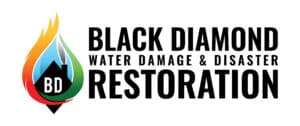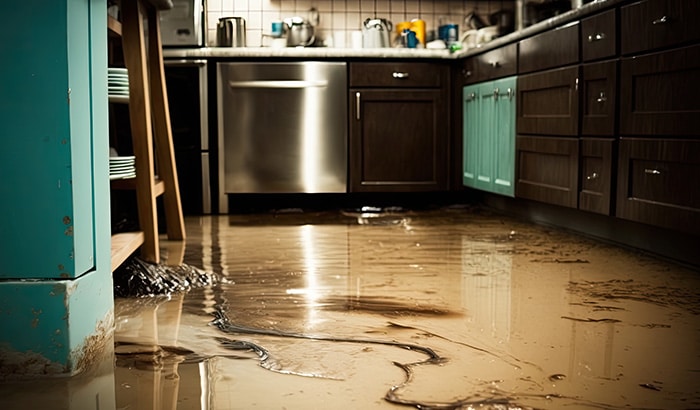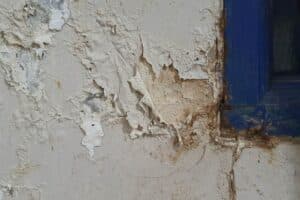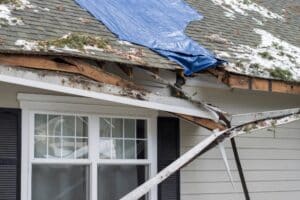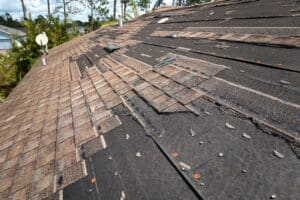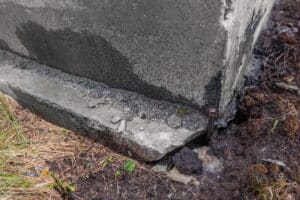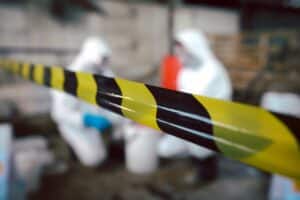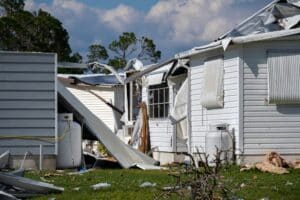Discovering water damage in your home is an immediate buzzkill, but knowing the crucial steps will help you get your home back to normal as quickly as possible.
Severe water damage or flooding in your house is one of the most hectic and financially troubling times as a homeowner. Broken pipes, a leaking appliance, or sewage backup can all lead to even larger problems down the line. Plus, no one has time to deal with the sudden inconvenience of water damage.
Today, we’re covering everything you need to know about water damage so you’ll be ready to act fast when calamity strikes. Here are eight steps you should take if you find a water problem in your home.
- Find the source
The first step in water damage restoration is to put on your best detective eyes and locate the source of the problem. If a broken pipe is at fault, stop the flow by turning off the water supply to your house. Is it seeping in through foundation cracks? You’ll need to hire a professional to fix it.
Knowing where the water is coming from also helps establish whether it is safe to drink. While a busted pipe under your sink isn’t ideal, at least you’re getting clean water. The same cannot be true for sewage backup floods.
2. Turn off power
Water and electricity do not mix. If you find significant flooding in the basement or near your electrical outlets, shut off your power immediately. If the water damage is minimal, then you can skip this step.
If your circuit panel is in the basement, don’t try to reach it to switch off the equipment. Instead, contact your utility provider and request the electricity be turned off. Once the water is gone and the area has dried, contact an electrician to evaluate your wiring. They’ll also check any other electrical items damaged in the flood.
3. Call insurance
Calling your insurance might not be top of mind when you’re dealing with a sudden pool of water in your basement, but this is a critical step. Call your agent as soon as you have a handle on the situation to begin the claims process.
While you are unlikely to obtain flood insurance that covers natural catastrophes such as storms, you are likely to be protected in the case of sewage backup or plumbing difficulties. Document the damage to the best of your ability and file your insurance claim. From there, they will send an adjuster to conduct a thorough inspection.
One reason to contact your insurance company as soon as possible is that they will have recommendations for mold remediation specialists or water damage restoration professionals in your region, saving you the time and hassle of finding them yourselves.
4. Mold
Mold can begin to grow within 24 hours following water damage in home, and once it has begun to grow, it’s tough to eradicate. The sooner you remove goods from the water and begin drying them, the less probable mold will destroy them.
As soon as you notice water damage in home, take whatever precautions possible to avoid mold growth. As you attempt to dry your belongings out, take care not to spread mold spores around your home. Mold often grows in your closet, cellar, and baths, among other discreet areas.
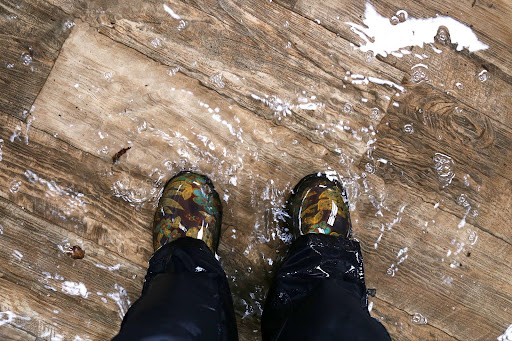
5. Remove standing water
Next, it’s time to remove as much of the standing water as possible. A shop vac will be your best friend as you navigate this step. Reach out to your local home improvement store for rentals, or contact a restoration team to clean it up.
It is possible to clean up standing water with a pile of towels, but a shop vac will get the job done faster and save you from an afternoon of laundry. Use heavy-duty extension cables to power equipment in rooms where the power has been turned off.
6. Drying process
Restoration professionals use huge air fans and dehumidifiers to thoroughly dry the affected areas. If you’re doing this on your own, try renting these items from a home improvement store. No matter your equipment, the goal is to circulate as much air as possible. Allow everything to run continuously for at least three or four days.
7. Water damage restoration
Water problems sometimes lead to even bigger catastrophes. Begin the repairs as soon as possible to avoid mold and structural damage to the home. To fully clean and restore your house, you need to hire a water damage restoration company. Professional organizations have the skills to repair water damage and inspect for mold and other potentially harmful conditions.
8. Moving back in
You’ll most likely need to stay in a hotel or with relatives and friends during the water damage restoration and cleanup procedure. It may take several weeks to restore your house to normalcy. Avoid spending time in or returning to your house until professionals have properly investigated it for mold or structural damage. You can return once you get the all-clear.
If water damage in home is not repaired, it can lead to serious health problems and property damage. While it might not appear to be that pressing, you should always address water damage as soon as possible.
Causes of water damage
Water damage has a mischievous side, lurking around your home, waiting for the perfect moment to strike. From burst pipes that turn your living room into a mini waterpark to leaky appliances playing a game of hide-and-leak, water damage sources are serious troublemakers of homeownership. Here are some of the most common causes for these soggy surprises:
- Clogged gutters – The gutter system on your home is designed to direct rainwater away from the building. However, gutters frequently become clogged over time by leaves, branches, and other sorts of debris. When this happens, rainfall cannot properly drain away from your property and instead overflows the borders of your gutters, runs down the side of the home, and causes water damage to the ceiling, walls, and flooring.
- Damaged pipes – Pipes run throughout the walls of your home, carrying water to all your appliances like a well-oiled machine. As pipes deteriorate over time, they may rupture or leak. Leaks caused by faulty pipes are difficult to detect. Unless the pipe completely bursts and pours gallons of water through your roof, you might not notice the issue for quite some time.
- Bad weather – Thunderstorms, hurricanes, and other natural catastrophes don’t usually occur on a regular basis, but when they do, there is always the possibility of water damage to your house. Strong gusts and heavy downpours may damage your roof, allowing rainwater to enter your home or property. Extreme weather sometimes causes flash floods, particularly if your house is in a flood-prone location.
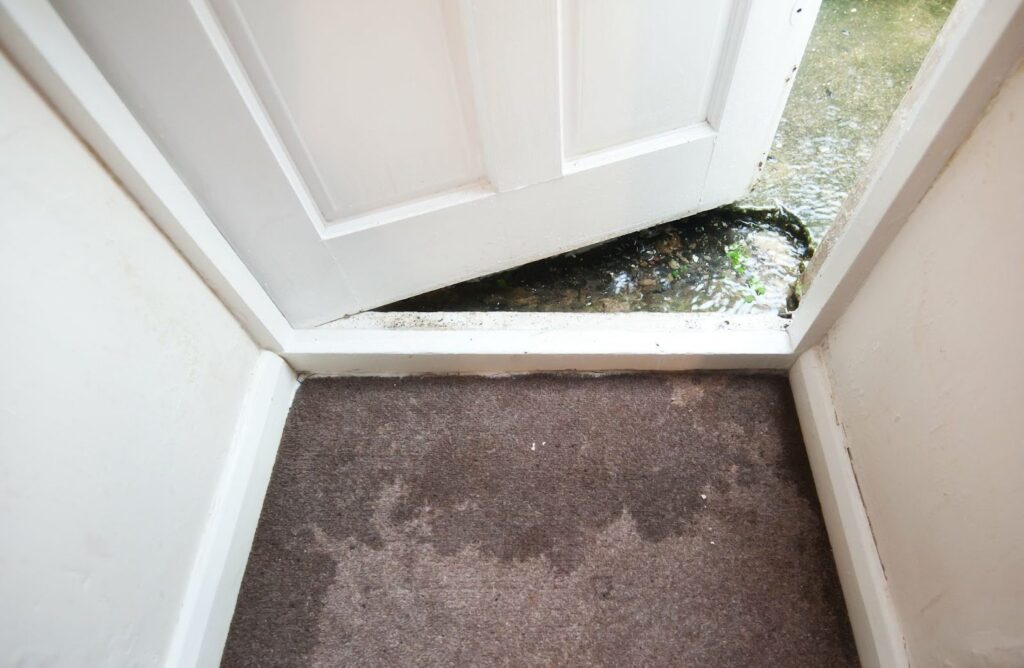
How to prevent water damage
Water damage is one of the main causes of property damage and loss in a home. It produces black mold, ruins drywall, and seriously damages your home’s foundation and structure. Anything from minor pipe leaks to clogged gutters can cause water damage. Here are some suggestions to prevent water damage from wreaking havoc in the first place:
- Clean gutters – Clean your gutters every six months to avoid blockages. Allow water to flow through your downspouts and remove any standing water that might damage your roof, gutters, or foundation. Pooled water around your foundation might seep beneath and leak into your basement.
- Examine your water bill – A significant increase in your water bill might indicate a problem with your home’s plumbing or supply line. To determine the presence of a leak, wait two hours without using any water and compare the readings on your water meter before and after this time. If the figure varies, a leak is a likely suspect.
- Inspect your roof – Look for broken bricks, loose mortar, and leaks in the attic. Climb a ladder and inspect the roof for cracked, missing, or loose shingles, then make the required repairs. If your roof develops a leak or any other problem that might lead to water damage, solve it as soon as possible.
Contact Black Diamond Restoration
While you do everything possible to prepare for water damage, there’s still the possibility of it causing catastrophic damage to your house. If your house has experienced damage due to water, call the professionals at Black Diamond Water Damage & Disaster Restoration.
We work relentlessly to handle all sorts of problems, including water, fire damage, storm damage, mold treatment, sewage backup, and biohazard cleanup. With us, you’ll feel confident that our qualified specialists are here to assist you in restoring your home or commercial space to the highest standards.
For all your storm damage repair requirements, contact Black Diamond Water Damage & Disaster Repair today. We do it all, and we do it quickly, with over 20 years of disaster repair experience to boot.
toto slot